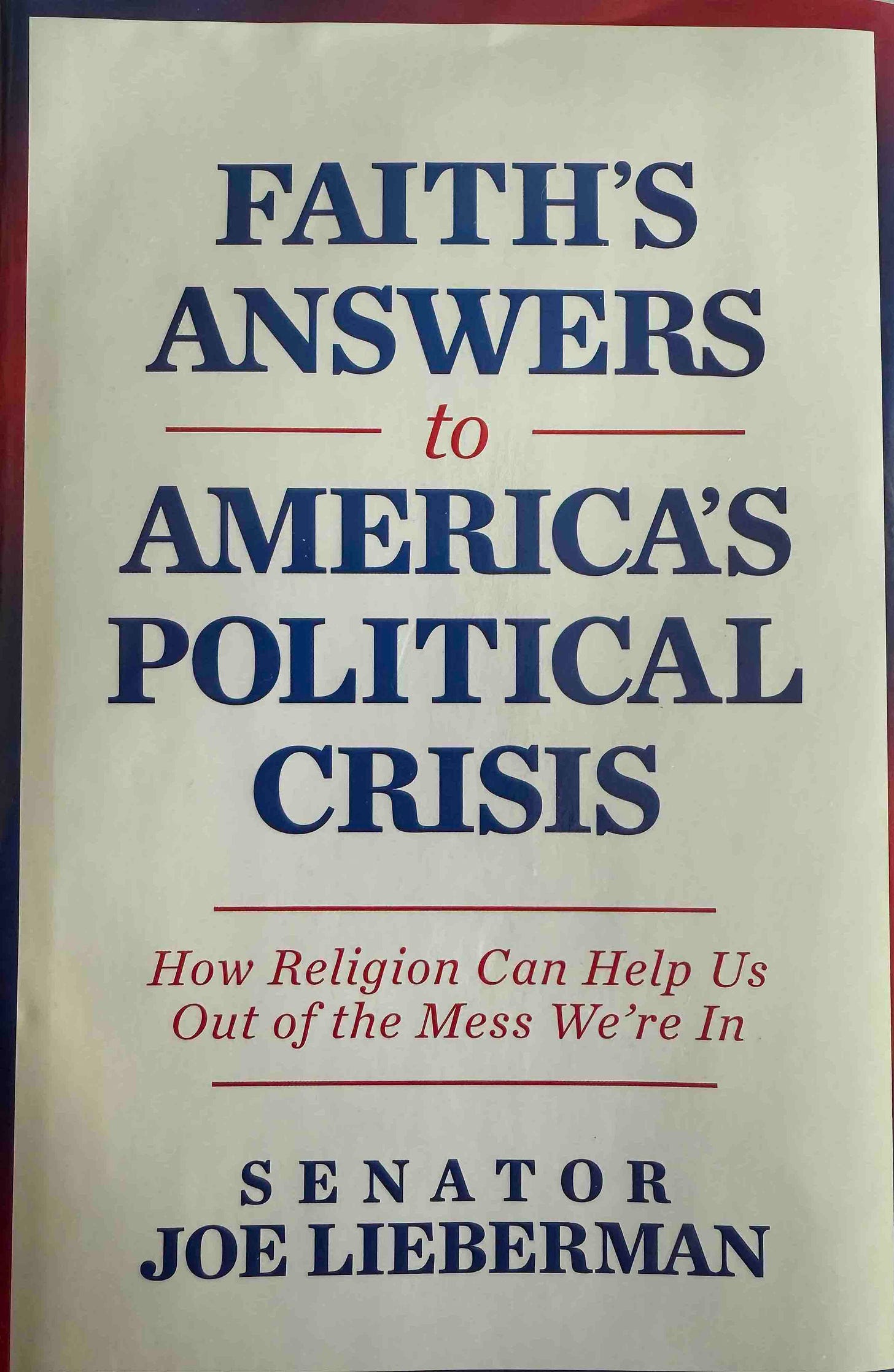Joe Lieberman on Faith’s Answers to America’s Political Crisis
“New religious awakening” would reduce the pessimism
Senator Joe Lieberman’s book “Faith’s Answers to America’s Political Crisis: How Religion Can Help Us Out of the Mess We’re In,” was published October 1, 2024. I’ve been waiting for the right moment to write about it, and today, which happens to be both Christmas and (tonight) the first night of Hanukkah, seems a good time.
The book hasn’t gotten much attention. Lieberman died in March of this year, so he wasn’t around to do the radio and television and podcast appearances and op-eds that typically help promote books. Fall of a presidential year is a tough time to publish a nonfiction book even for a live author, as I learned in November 2008 with “Samuel Adams: A Life,” which really became a full-fledged hit only months later as a paperback. The Lieberman book is published by Post Hill Press, which isn’t one of the giants. I heard about it via Matt Lieberman’s The Lieberman Files Substack.
The book’s argument is that religious values can help overcome America’s political problems—”partisanship, incivility, districts, inability to debate, and unwillingness to compromise.” The chapter I found most newsworthy is the conclusion, which says, “Historians generally agree that we have had four American religious awakenings. They began in 1735, 1805, 1865, and 1965. Each involved a return to religiosity, mostly among Christians.”
“Now we need a new religious awakening in America,” Lieberman writes, “As was true before the other awakenings, the American people’s religious affiliations have been declining.” He cites Gallup surveys showing declining church membership and Pew polls showing an increase in those who “chose ‘none’ for their religion—atheism, agnosticism, or ‘nothing at all.’”
“One of the most significant benefits of a new religious awakening in America is that it would reduce the pervasive and uncharacteristic pessimism about the future that now exists among the American people,” Lieberman writes. He acknowledges that changes in the economy, population, culture, and environment have fueled anxiety, but notes, “research consistently shows that religious people are more optimistic.”
I’ve been collecting signs of this new religious awakening.
“Faith is coming back to America, and FAST!” Donald Trump posted to social media on December 20. He was selling Bibles. Some fault him for trying to make money. Every other recent former president, and some other recent presidential candidates, have also made money by selling books. Rather than making like the other presidents and selling a book about himself, Trump is selling Bibles. Trump has plenty of flaws, but he has also a fairly reliable sense of what a lot of the American people want. He thinks they want to buy Bibles. It’s interesting.
The New York Times, which serves a different demographic than Trump does, has also recently published a series of stories hinting at a religious revival. A news article about “spiritual Democrats” such as Senator Warnock of Georgia, Pete Buttigieg, and Governor Shapiro of Pennsylvania reports on what the New York Times’ Katie Glueck describes as “a small but prominent cast of Scripture-quoting, religiously observant Democratic politicians — many of them poised to command national attention over the next four years.” A Times arts section essay by Pulitzer-Prize winning composer David Lang concludes, “I believe the power of religion, mine and anyone else’s, is to help a community envision how to live in a better world, together.” Some of this may just be typical Christmas- or Hanukkah-season stuff, presented as dutifully as a fundraising appeal for what used to be known as the Times Neediest Cases Fund. But some of it may be a signal that the secular trend has bottomed out and that religion is resurgent. Times opinion columnist Ross Douthat has a book coming out on February 11, 2025, titled, “Believe: Why Everyone Should Be Religious.”
Both the Jewish and the Christian holidays point in their way to comeback stories. Hanukkah marks the rededication of the Temple in Jerusalem after its desecration. Christmas, Jesus’s birthday, marks the beginning of a life that in Christianity’s telling includes an eventual resurrection. Even the secularists and followers of science alone see at this time of year, at least in the Northern Hemisphere, the days stop shortening and daylight begin lengthening.
Lieberman struck some people as sanctimonious, though among his charms was his self-deprecating sense of humor about such things. I love the idea of an American religious awakening and I love the idea of Lieberman’s advocating for it even posthumously (though it’d be better if he were around still to do it while alive). My own holiday thoughts revolve, though, less around the idea of religion as a fix for America’s political ailments (helpful though it surely would be, as Lieberman describes). My own thoughts tend more toward appreciating the way these holidays bring families and communities together in gratitude, kindness, and meaning.
Merry Christmas, Happy Chanukah, Happy Holidays, Seasons Greetings, to all readers of The Editors, with gratitude for your attention and support over the past months and with optimism for the days ahead.




Here's where we part company. We pretty much agree on the evils that beset America, and the abandonment of reason produced them all. What is faith, other than pretending something is true when your reason tells you it isn't?
Religion and faith produced the Sermon on the Mount, and that produced Marx. Marx is nothing but Christian self-effacement without the theology. "The meek shall inherit the Earth," "He who is last shall be first," "Be like the lilies of the field; they neither sew nor spin," "From each according to his ability, to each according to his need"--it's all the same kind of worship of neediness.
Freedom can't be sustained on the basis of faith, religion, and need-worship.
Merry Xmas.
Amen!